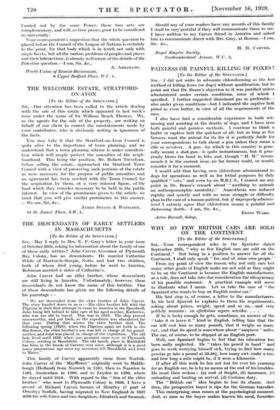WHY SO FEW BRITISH CARS ARE SOLD ON THE CONTINENT
[To the Editor of the SPECTATOR.] SIR,—Your correspondent asks in the Spectator dated September 28th, " why so few English cars are sold on the Continent." Not being in a position to answer for all the Continent, I shall only speak " for, and of, mine -own people."
From my point of view the reason why not only cars but many other goods of English make are not sold as they ought to be on the Continent is because the English manufacturer, as a rule, does not take into due consideration the idiosyncrasy of his possible customer. A practical example will serve to illustrate what I mean. Let us take the case of " the Spaniard who wants to buy an English motor car."
His first step is, of course, a letter to the manufacturers. In his best Spanish he explains to them his requirements, asking about prices, weight, speed and so on,---and very politely remains : su afectisimo seguro seividor. . . • - If he is lucky enough he gets, sometimes, an answer of the ,` take it or leave it " kind in English, telling him that the car will cost him so many pounds, that it weighs so many cwt., end that its speed is somewhere about " umpteen " miles. The car, of course, to be shipped at an English port.
Well, our Spaniard begins to feel that his education has been sadly neglected. He " takes_ his pencil in hand " and goes to work worrying himself sick, trying to find how many pesetas go into a pound at 33.481, how many cwt.. make a ton, and how long a mile might be, if it were a kilometre.
If after all this work he has not lost for ever his yearning for an English car, he is by no means at the end of his troubles. He must then reckon : (a) cost of freight, (b) insurance, (c) unloading and hauling on arrival, (d) CustOrps duty.
The " British car " idea begins to lose its charm. And then, the prospective buyer is ripe for the. German traveller.
• This enterprising man comes at the psychological moment. And, as soon as the buyer makes known his need, furnishes
him with the price in pesetas of the German car which is there panting op his door-step, ready to take the family for a jaunt. No worry about rates of exchange, nor Customs, nor freights. That is, or ought to be, the seller's not the buyer's job. And in nine cases out of ten he gets not only all his information, so to speak ready digested, but a deferred payment system and a couple of spare tyres as well.
Granted that the German car will probably go to pieces, when his English brother would still be up and kicking ; granted that to buy cheaply is to buy twice, but . . . what about the line of least resistance ?
If you want our custom, and we think in pesetas, and kilos and metres, do not pretend to make us think in pounds and cwt. and miles, because very likely we won't try to adapt ourselves to your way of thinking, because the path of the prospective buyer must be made an easy one, not a Grand National of technical hurdles.
Up till now we have considered the case of a man wanting to buy a single commodity. Now think what it would mean for the big shop owner, the buyer for an emporium, &c., to have to repeat those calculations for every single item he wanted. That is why the German traveller, for instance, is always welcomed. Because he takes not only all the trouble from the customer's shoulders but provides him, as well, with a deal of useful information about the state of markets, conditions of demand and so on.
And what applies to Spain applies to the rest of the Continent especially the Latin nations. The same logic holds good. If I dared to offer advice to English manu- facturers in their dealings with foreign buyers, I should only say : " Put yourselves in their places."—I am, Sir, &c.,
E. Tones VALCARCEL. Mar i Cd Hotel, Puerto Pollensa, Mallorca.
[From our personal experience in many parts of the world we fear that Sefior Valcarcel is right. The average British manufacturer is not as enterprising as his Continental rival and as a rule fails to place himself in the position of the prospective purchaser.—En. Spectator.]









































 Previous page
Previous page